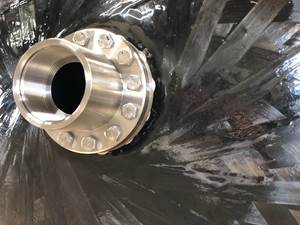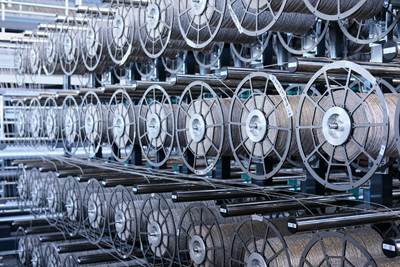BMW unveils new M4 GT4 race car, features most natural fiber parts for GT series to date
Bcomp ampliTex and powerRibs technologies make up bodywork components such as the hood, front splitter, doors, trunk and rear wing and several interior components, taking next steps for future production models.
The latest M4 GT4 race car model with several natural fiber components. Photo Credit: BMW, Bcomp
(Munich, Germany) announced that it has launched the successor of its M4 GT4 race car. With Bcomp’s (Fribourg, Switzerland) recent incorporation as an official BMW M Motorsport partner, this next evolution of the M4 GT4 series has taken sustainability to a new level, extensively using Bcomp’s ampliTex and powerRibs natural fiber composite technologies for a range of vehicle components.
BMW says it first started to work with Bcomp’s materials in 2019 when incorporating the high-performance fibers in the company’s iFE.20 Formula E car. From this flax fiber-reinforced cooling shaft, the collaboration evolved and soon after, ampliTex and powerRibs natural fiber solutions were found to successfully substitute selected carbon fiber components in DTM touring cars from BMW M Motorsport. The M4 GT4 is said to be the latest in a line of vehicle programs that this material has been expanded into.
BMW contends that the serial GT car has the highest proportion of natural fiber components to date. Bcomp’s ampliTex and powerRibs solutions can be found throughout the interior on the dashboard and center console, as well as on bodywork components such as the hood, front splitter, doors, trunk and rear wing. Aside from the roof, BMW notes that there is almost no carbon fiber-reinforced plastic (CFRP) components that were not replaced by natural fibers.
“Product sustainability is increasing in importance in the world of motorsport, too,” Franciscus van Meel, chairman of the board of management at BMW M GmbH, says. “So, we are delighted to have Bcomp on board as an official BMW M Motorsport partner for the BMW M4 GT4 project.”
According to the company, the use of natural fibers reduces greenhouse gas (GHG) emission reductions from cradle to gate up to 85% while adding performance benefits like improved vibration damping. Ductile failure mode without sharp debris and splinters, and stiffened parts also reduce dangerous debris upon impact during crashes, enhancing driver safety. Moreover, as the natural fiber components reach their end of life, BMW says they can be processed through the standard waste management system.
Interior shot of the M4 GT4.
Taking the findings and experience gained on the track as a basis, the material technologies will also find their way into BMW M models, and BMW M Performance Parts, as stated by BMW Group. The development collaboration between BMW Group Research and Bcomp is also working on the use of new sustainable material solutions for future production models. Developing such innovative materials forms a key element of the sustainability strategy of the BMW Group, which is seeking to lower its vehicles’ life cycle carbon emissions by more than 40% by 2030 compared to 2019 levels.
“We are honored and happy to look back on such exciting joint milestones and even more on the adventures lying ahead of us with BMW,” Johann Wacht, manager motorsports and supercars at Bcomp, says. “Proving the performance of ampliTex and powerRibs on the highest level of Formula E and the DTM Class 1 era, and now embracing natural fiber parts to such a high extent on the new M4 GT4 customer racing program is a consequent and unparalleled statement towards scaling sustainable lightweighting.”
Related Content
“Structured air” TPS safeguards composite structures
Powered by an 85% air/15% pure polyimide aerogel, Blueshift’s novel material system protects structures during transient thermal events from -200°C to beyond 2400°C for rockets, battery boxes and more.
Read MoreInfinite Composites: Type V tanks for space, hydrogen, automotive and more
After a decade of proving its linerless, weight-saving composite tanks with NASA and more than 30 aerospace companies, this CryoSphere pioneer is scaling for growth in commercial space and sustainable transportation on Earth.
Read MoreThermoplastic composites: Cracking the horizontal body panel nut
Versatile sandwich panel technology solves decades-long exterior automotive challenge.
Read MoreCarbon fiber, bionic design achieve peak performance in race-ready production vehicle
Porsche worked with Action Composites to design and manufacture an innovative carbon fiber safety cage option to lightweight one of its series race vehicles, built in a one-shot compression molding process.
Read MoreRead Next
Mercedes-AMG GT4 race cars now equipped with Bcomp natural fiber composite bumpers
Bcomp works with engineering specialist HWA to phase in natural fiber bumpers, replacing carbon fiber versions. Analyses report a 90% reduction in material emissions and thermal energy recovery potential.
Read MoreBMW Group invests in Bcomp for high-performance natural fiber components
Collaborative partnership in motorsport moves to the next level for the use of renewable raw materials for future vehicle model components, and joint R&D materials work for production vehicles is underway.
Read MoreCutting 100 pounds, certification time for the X-59 nose cone
Swift Engineering used HyperX software to remove 100 pounds from 38-foot graphite/epoxy cored nose cone for X-59 supersonic aircraft.
Read More












